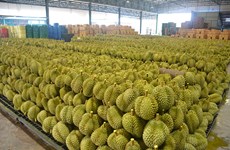ASEAN works to protect rare flora, fauna
Increasing both regional and international cooperation in preserving
biodiversity and countering illegal cross-border trade in endangered
flora and fauna has been defined as a key mission of the ASEAN Wildlife
Enforcement Network (ASEAN-WEN), a workshop heard in Hanoi on May 27.
Increasing both regional and international cooperation in preserving
biodiversity and countering illegal cross-border trade in endangered
flora and fauna has been defined as a key mission of the ASEAN Wildlife
Enforcement Network (ASEAN-WEN), a workshop heard in Hanoi on May 27.
The maintenance of the network’s operational efficiency is primarily the responsibility of all 10 members of the grouping, said Deputy Minister of Agriculture and Rural Development Vu Van Tam.
However, as most of the nations in the bloc face shortages of human resources, finance and techniques, cooperation and assistance from other regional and global organisations in the field are of necessity, Tam added.
Sharing this view, Secretary General of the Convention on International Trade in Endangered Species of Wild Fauna and Flora (CITES) management agency John E.Scalon said the widespread participations of global partners who have the same goals to struggle against wildlife crimes will help the network summon all resources to develop sustainably.
Southeast Asia is endowed with rich biodiversity, however more than 40 percent of which is being threatened due to illegal exploitation and trade. This has seriously undermined the ecological system and economic growth alike and menaced the security in the region and the world.
The establishment of the ASEAN-WEN in 2005 demonstrates the strong commitments of the bloc’s members to protecting rare flora and fauna in each country and the region as a whole.
Founded in 1967, the Association of Southeast Asian Nations (ASEAN) groups Brunei, Cambodia, Indonesia, Laos, Malaysia, Myanmar, the Philippines, Singapore, Thailand and Vietnam.-VNA
The maintenance of the network’s operational efficiency is primarily the responsibility of all 10 members of the grouping, said Deputy Minister of Agriculture and Rural Development Vu Van Tam.
However, as most of the nations in the bloc face shortages of human resources, finance and techniques, cooperation and assistance from other regional and global organisations in the field are of necessity, Tam added.
Sharing this view, Secretary General of the Convention on International Trade in Endangered Species of Wild Fauna and Flora (CITES) management agency John E.Scalon said the widespread participations of global partners who have the same goals to struggle against wildlife crimes will help the network summon all resources to develop sustainably.
Southeast Asia is endowed with rich biodiversity, however more than 40 percent of which is being threatened due to illegal exploitation and trade. This has seriously undermined the ecological system and economic growth alike and menaced the security in the region and the world.
The establishment of the ASEAN-WEN in 2005 demonstrates the strong commitments of the bloc’s members to protecting rare flora and fauna in each country and the region as a whole.
Founded in 1967, the Association of Southeast Asian Nations (ASEAN) groups Brunei, Cambodia, Indonesia, Laos, Malaysia, Myanmar, the Philippines, Singapore, Thailand and Vietnam.-VNA













